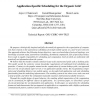79 search results - page 7 / 16 » Self-Organizing Scheduling on the Organic Grid |
JUCS
2010
13 years 6 months ago
2010
: Directories provide a general mechanism for describing resources and enabling information sharing within and across organizations. Directories must resolve differing structures a...
SASO
2009
IEEE
14 years 2 months ago
2009
IEEE
This paper introduces MOCAS (Model Of Components for Adaptive Systems), a generic state-based component model which enables the self-adaptation of software components together wit...
SASO
2007
IEEE
14 years 1 months ago
2007
IEEE
Grid and ubiquitous computing systems generally consist of a large number of networked nodes with applications implemented as distributed services or processes, respectively. A cr...
JVA
2006
IEEE
14 years 1 months ago
2006
IEEE
Grid computing is a form of distributed computing that involves coordinating and sharing computing, application, data storage or network resources across dynamic and geographicall...
CLUSTER
2004
IEEE
13 years 11 months ago
2004
IEEE
We propose a biologically inspired and fully-decentralized approach to the organization of computation that is based on the autonomous scheduling of strongly mobile agents on a pe...

